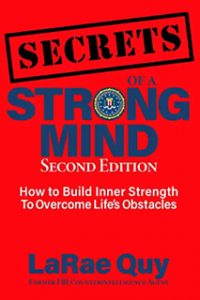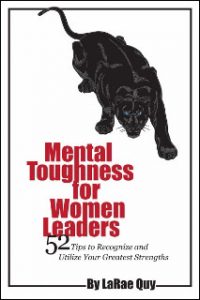The career advice we receive changes as we age. As children, we’re encouraged to dream big about the things we want to accomplish in life. We grow up and assume we’ll do what we love.
As we become adults, the message starts to focus on how we can be successful. We begin to look at the subjects in which we excel in school. Grades become the measuring stick of our future.
Most of all, we’re told to be practical, find a good job, and stay there.
Those messages muddle our thinking when we seek out career advice. We look for ways to be successful rather than pursue the things we love. Too often, success is where we stop on our journey to what we truly want to do in life.
It takes mental toughness to say, “I want to create my own path” because it may not be where you found success. You may need to move out of your comfort zone to escape the mediocrity that has been aided and abetted by your career choices.
Success and self-awareness can happen at the same time, but they are not the same thing. If our quest for success is not in alignment with what matters most to us, we’ll be left empty and disappointed in the end.
Success is a competitive game. It triggers a breathless sprint to be the happiest, the richest, the sexiest, the most admired—you get the picture. This is the feedback loop from hell because today’s success story is always replaced by tomorrow’s newer, better thing.
The Stoics would say that being a good person, doing what matters most to you, and doing the right thing are the important things in life. It’s OK if you don’t find the cure for cancer or write the great American novel. What is important is choosing what matters most to you in life. And, what does not matter.
As successful leaders, entrepreneurs, and business owners, you’ve treated your career as a business. A business becomes prosperous when it has a clear vision for itself in the marketplace. Goals come later, after the vision is defined.
The same goes for you. In the absence of a vision for your life, goals are nothing more than a long to-do list.
Here is the truth about 3 great career tips that you will never hear—they are simple, but very important if you want a career built around what is meaningful to you:
1. Answer The Right Question
This is a clarifying exercise I did while in seminary. We turned to the person next to us and asked, “What do you want?” We asked the question and waited for the answer. Then we asked it again and again—fifteen times. At first, the answers were predictable: “I want a new car, I want a bigger house, I want to make more money, etc.”
After the mind is cleared of the superfluous stuff, deeper issues start to come out. “I want to be loved, I want to serve God, I want to help people tap into their inner strength.”
TIP:
The key is asking the same question fifteen times to dig beneath the surface to uncover what matters most to you. Everyone’s answers will be different, and the person to whom you are talking doesn’t even need to be a friend, but it does need to be someone you trust.
2. Remember the Crossroads
We have all been forced to make choices. Many of them had little impact on the direction of our life. Some, however, were big ones—crossroads choices—that moved us in a new direction. For example: in my second year at college I had to choose my major. My heart told me to pursue a degree in history, but my head told me that a degree in business management would be more marketable.
After I retired from the FBI, I knew I wanted to go back to school. I found myself revisiting the same question; again, I decided not to pursue the history degree and enrolled at San Francisco Theological Seminary. Any doubt I had about whether history would ever be more than a hobby was now firmly decided—it would not.
TIP:
- Concentrate on one period of your life at a time
- Go back to a particular period in your life and identify a crossroad event
- Write up three paragraphs describing the crossroad event as best you can
- Focus on the key factors that influenced your decision
- Would those same factors influence your decision today?
3. Embrace Your History
Do not fear the future; instead, read the past.
Don’t live in the past, but it’s a great place to visit. Looking back, for most people, is usually a mixed bag. There are bright moments, but there are also shadows. To truly understand ourselves, however, we need to delve into both the light and the shadow.
Life is hard. Pain is inevitable. Growth is optional.
It does no good to make excuses or blame others for your situation. Successful people do not see themselves as a victim—ever! Instead, they recognize that their situation may not be perfect right now but they also know they have the power to change it.
One of the most important tools an investigator uses is surveillance. It allows agents to gain an understanding of the target’s habits, routines, and contacts.
TIP:
Place yourself under surveillance. Go back in your history and identify an inflection point—actions, people, ideas, or events that moved your life in a new direction.
How did you change during that period? How did it contribute to what you are today? To assist with this, recall the following:
- Key people
- Activities that demanded time and attention
- Important ideas
- The nature of your inner life: dreams for your life, longings, and emotions
- The nature of your health: exercise, sports, and illness
- Creative impulses that shaped you
- External events that shaped you
Summary
If you don’t grow, everything becomes a repetition of the past. As the leader of your life, decide which behaviors served you well enough that you want to repeat. Conversely, identify the behaviors and reactions that you don’t want to repeat so you can let go of what doesn’t work for you.
© 2018 LaRae Quy. All rights reserved.
You can follow me on Twitter, Facebook, Instagram, AND LinkedIn
Are you mentally tough? Here is my FREE Mental Toughness Assessment
Get my new book, “Secrets of a Strong Mind (second edition): How To Build Inner Strength To Overcome Life’s Obstacles”
Author of “Mental Toughness for Women Leaders: 52 Tips To Recognize and Utilize Your Greatest Strengths”





Good insights! Sometimes we need new ways of seeing the problems that are keeping us stuck. I’m also reminded of my sister who always wanted to be a fashion designer but needed to know how to draw. Her college art teacher told her it wasn’t going to happen for her – let’s just say she wasn’t naturally successful when it came to art. She persisted and didn’t give up on what she knew she wanted to do and ultimately became a designer. She often joked about getting back in touch with her old art teacher.
Thanks for this one, LaRae! Will share!
Alli
Any thoughts, Q! ?
I am guessing that your seminary/theological education was just as crucial to your success as an FBI agent and your successful career as a consultant as was your FBI training.
M.
PS Great article.
A very important post for all of us LaRae! I believe that our past impacts our present but doesn’t need to define it. I find that noticing what colleagues or friends come to us for help with can be a key indicator of what are some of our gifts. If we can interject some of those strengths and talents into our career choices and also follow areas we are fascinated, we will ultimately have more satisfying careers. Thanks LaRae!